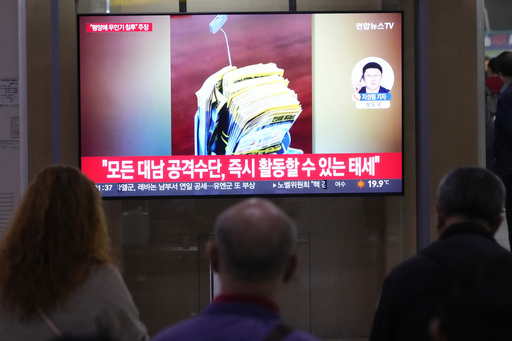SEOUL, South Korea — North Korea has made serious accusations against South Korea, claiming that drones from the South have been flying over its capital to release anti-North Korean propaganda leaflets. In response, North Korea has threatened to take military action if such incidents persist. Meanwhile, South Korea has issued a vague denial of these claims.
North Korea’s Foreign Ministry stated in a press release last Friday that South Korean drones were purportedly spotted in the skies above Pyongyang on multiple occasions, including October 3, as well as on Wednesday and Thursday of the current week. The ministry condemned these alleged activities as a gross violation of North Korea’s “sacred” sovereignty and a threat to its national security, labeling the supposed drone flights as a “dangerous provocation” that could lead to armed conflict or even war.
In a firm warning, the ministry indicated that North Korean military forces are preparing all available means to retaliate against the southern neighbor and its military forces if drones from the South intrude again. “The safety lock on our trigger has now been released,” the statement read, emphasizing that North Korea is ready for all eventualities and will be vigilant against further transgressions.
During a parliamentary session, South Korean Defense Minister Kim Yong-hyun addressed queries regarding North Korea’s claims, stating, “We have not done that.” He mentioned that he needs additional time to verify the situation, offering no further clarification on whether he was specifically referencing South Korean military drones or civilian-operated drones.
The South’s Joint Chiefs of Staff released a statement stating that they could not confirm the validity of the North’s claims, though they did not provide detailed reasoning. They cautioned North Korea to exercise caution and not to act in an irresponsible manner. “If the safety of our citizens is threatened in any way, our military will respond with stern and thorough retaliation,” they remarked.
North Korea is particularly sensitive to foreign criticism of its leadership under Kim Jong Un and the dynastic rule of his family. Since May, North Korea has been retaliating against South Korean civilian activists by dispatching thousands of balloons filled with debris, including paper waste and plastic, into South Korea. In a notable escalation, North Korea launched additional balloons towards the South on Friday evening, leading South Korean joint chiefs to caution civilians about potential falling objects.
In response to these provocations, South Korea’s military has adopted unconventional tactics, broadcasting propaganda—including K-pop music—across the border to the North through loudspeakers. These psychological warfare initiatives have increased tensions, especially following North Korea’s latest weapons tests and veiled nuclear threats towards both Washington and Seoul. In retaliation, the U.S. and South Korea have fortified military exercises and enhanced cooperation with Japan, strengthening their nuclear deterrence strategies involving U.S. strategic assets.
This past Wednesday, North Korea declared its intention to seal its border with South Korea permanently, along with plans to construct fortifications along the front lines to counter what it termed “confrontational hysteria” from South Korean and U.S. forces. The North’s military asserted that it will “completely cut off roads and railways” connecting to the South while solidifying the defenses on its territory.
The actions from Pyongyang have been characterized as a “self-defensive measure” aimed at protecting national security against the alleged aggressive postures of its rivals. North Korea accused South Korea of increasing military activity, deploying U.S. assets, and using harsh rhetoric.
Experts opine that Kim Jong Un’s push to develop nuclear capabilities is geared toward compelling the United States to recognize North Korea as a nuclear state, thereby allowing the regime to negotiate security and economic advantages from a position of strength. In recent comments provided earlier this month, South Korean President Yoon Suk Yeol indicated that North Korea might orchestrate provocative actions—such as testing nuclear weapons or intercontinental ballistic missiles—around the upcoming U.S. presidential election in November to capture Washington’s attention. Yoon has also voiced his disapproval of North Korea’s balloon operations, warning that the North will face consequences if these actions threaten the safety of South Koreans. However, he did not provide further details on the potential government response.
